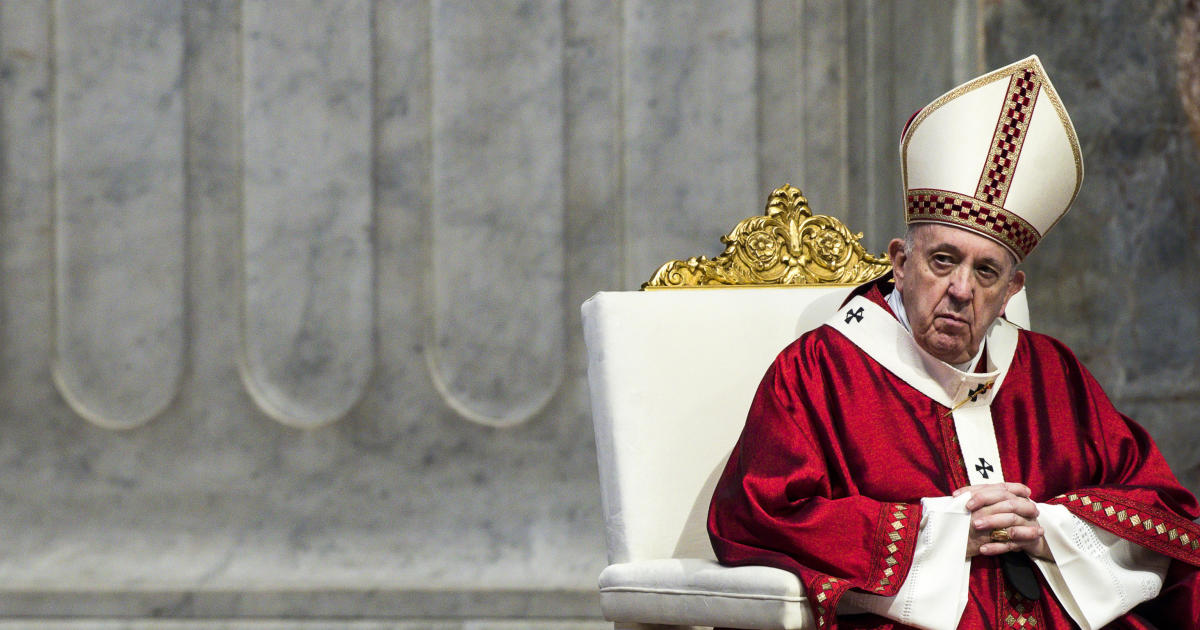Pope Francis expresses support for the U.S. protests against racial injustice in his new book “Let Us Dream,” the Associated Press reports. In the book, due out December 1, the pope also criticizes the forceful downing of statues during protests, saying they are an attempt to “purify the past.”
In the 150-page book, Pope Francis references George Floyd, a black man killed when a Minneapolis police officer kneeled on his neck during an arrest in May.
Former officer Derek Chauvin held his knee against Floyd’s neck for nearly eight minutes, and the disturbing and devastating scene was caught on video, sparking protests nationwide. “Abuse is a gross violation of human dignity that we cannot allow and which we must continue to struggle against,” the pope said about Floyd’s death and subsequent protests.
Many demonstrations resulted in protesters vandalizing or toppling statues of U.S. Confederate leaders and other historic figures.
Protesters in other demonstrations took down several statues of Junipero Serra this year, according to CBS Los Angeles. Serra was was canonized by Pope Francis in 2015 and was the first canonization on U.S. soil. Critics say as an agent of Spanish colonialism, Serra is guilty of poor treatment of Native Americans, who were forced to convert to Catholicism.
A statue of the controversial Catholic saint was defaced with red paint and torn down in San Rafael, California last month, with protesters calling it a “Red Paint Rally” to mark Indigenous Peoples’ Day, according to CBS San Francisco.
Just days after the pope announced the sainth…
00:38
The pope said a better way is to debate the past through dialogue, and called removing statues an attempt to erase history, according to the AP. “Amputating history can make us lose our memory, which is one of the few remedies we have against repeating the mistakes of the past,” Pope Francis writes in the book.
It seems the pope further addresses American politics and issues subtly, without naming the U.S. or President Trump, the AP reports.
“Today, listening to some of the populist leaders we now have, I am reminded of the 1930s, when some democracies collapsed into dictatorships seemingly overnight,” the pope writes. “We see it happening again now in rallies where populist leaders excite and harangue crowds, channeling their resentments and hatreds against imagined enemies to distract from the real problems.”
Pope Francis criticizes “superficially religious people” who vote for populists out of fear – not religious conviction – to protect their religious identity. Pope Francis says “fear and hatred of the other cannot be reconciled with the Gospel.”
According to the AP, Pope Francis also addresses the global coronavirus pandemic, criticizing those who protest restrictions “as if measures that governments must impose for the good of their people constitute some kind of political assault on autonomy or personal freedom!”
While he praised journalists for reporting on how impoverished people are being affected by the pandemic, he also accused Catholic media and some in the church of being part of the problem, according to the AP.
He also criticized some media organizations for using the crisis “to persuade people that foreigners are to blame, that the coronavirus is little more than a little bout of flu, and that restrictions necessary for people’s protection amount to an unjust demand of an interfering state,” The AP reports.
“There are politicians who peddle these narratives for their own gain,” he writes. “But they could not succeed without some media creating and spreading them.”
In the book, Pope Francis explains his three personal “Covid” moments of solitude, according to the Vatican. “I’ve experienced three ‘Covids’ in my own life: my illness, Germany, and Córdoba,” he writes.
The first occurred when Francis was just 21. He had a serious lung infection during his second year in the seminary at Buenos Aires, and in the book, he recognizes the two nurses who helped him in the hospital.
According to the Vatican, the near-death experience changed how Pope Francis saw life, giving him him a good idea of how people with Covid-19 feel as they struggle to breathe on ventilators. “I remember hugging my mother and saying: ‘Just tell me if I’m going to die,'” he writes.
The second “Covid” moment came when he lived in Germany in 1986. He felt a sense of non-belonging there and spent much of his time watching planes, missing Argentina. And when his home country won the World Cup, he felt the loneliness of a victory he couldn’t share.
The third moment came when he spent one year, 10 months and 13 days in the Jesuit residence in Córdoba, Argentina between 1990 and 1992, the Vatican says. He hardly left the house, so the experience was similar to a lockdown.
The pope called it a self-imposed lockdown, which did him good because he was able to write, pray and developed ideas, according to the Vatican.
Pope Francis wrote “Let Us Dream” with ghost writer Austen Ivereigh, an English-language biographer, according to the AP.
According to the book’s publisher, this is the first book written by a pope during a major world crisis, the AP reports. Ivereigh said the book is a response to the lockdown and coronavirus pandemic, which has killed more than 1.4 million people globally.
